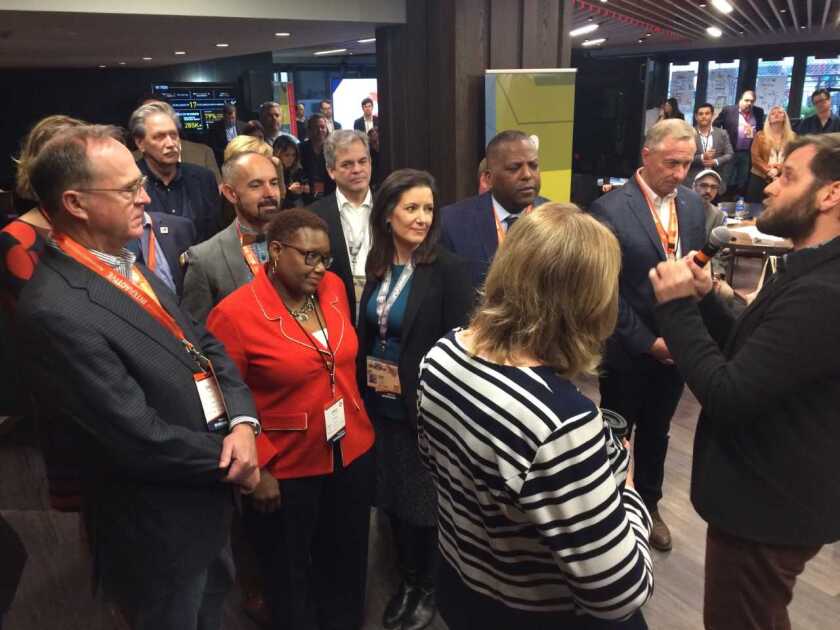Wednesday, March 14, 12:40 p.m. CDT
SXSW Takeaways: 'The Immediate Future Is All About Cities'
We recorded a special episode of our new Go Public podcast live from South by Southwest. We interviewed mayors about what they focused on in Austin, and what they're biggest takeaways from the event are as they head home.Have a listen!
Continue to podcast >>
Wednesday, March 14, 12:31 p.m. CDT
At South by Southwest, Pragmatist Mayors Learn to Think Like Futurists
Mayors pride themselves on being pragmatists who solve their city’s pressing problems of today. So what happens when you ask them to imagine a future well beyond their next election?At the Civic I/O summit at South by Southwest, mayors from around the country went back to school to learn how to think like a futurist.
“Foresight is a leadership competency,” says Stuart Candy, director of the Situation Lab at Carnegie Mellon University, one of the futurist trainers at the summit. “Every leader in every organization needs to be thinking ahead, but not everybody is trained in that or experienced in it.”
In one training exercise, mayors played a card game called The Thing from the Future, in which they had to imagine artifacts in their city in 2030 that illustrate how the world has changed.
Keep reading >>
Wednesday, March 14, 12:22 p.m. CDT
How Can Government Fix Procurement? This Startup Founder Has Some Advice.
At South by Southwest, we caught up with Sascha Haselmayer, founder and CEO of Citymart, a startup that won $5,000 at the Civic I/O mayors pitch competition on Sunday.In this interview, he talked to us about how he got interested in public purchasing. "When I was 7 I did not think, 'Oh, I want to have a career in public procurement,'" he says.
Haselmayer, an architect by training, explains how he came to found a company to help governments make more informed decisions about the goods and services they procure. "Everyone would expect that if I have money and I have a problem, I can get the best possible outcome. And that’s just not happening."
Wednesday, March 14, 7:22 a.m. CDT
As He Prepares to Step Down, Mitch Landrieu Talks Legacy
New Orleans Mayor Mitch Landrieu will be leaving office in May when his term expires.At South by Southwest this weekend, we interviewed Landrieu about "In the Shadow of Statues," his forthcoming memoir about his decision to remove Confederate monuments and confront the history of racism in his city. "I've been very clear and forthright that in the country it's really our Achilles' heel," he says. "We can't go around it, we can't go over it, we can't go under it, we have go through it, which means we have to talk about it, recognize and acknowledge it, put it in its appropriate place and think about ways that we can go forward together."
Wednesday, March 14, 7:18 a.m. CDT
Richmond, Va.'s Unique Approach to Fighting Poverty
We're still posting some videos we shot over the weekend at South by Southwest.In this interview, recorded on the noisy tradeshow floor of SXSW, J.B. Wogan talks with Richmond, VA Mayor Levar Stoney about promoting the city's brand and what it means to be an inclusive city.
The mayor also talked about his efforts to promote Richmond as a magnet for millennials and the employers who want to hire them. He discussed the city’s Office of Community Wealth Building, a first-in-the-nation antipoverty program, and his position on the Confederate statues along Richmond's Monument Avenue. “Those are relics of a Jim Crow past. They don’t reflect what the city of Richmond looks like currently,” he says. “Richmond is a welcoming, inclusive place and those don’t send that sort of welcoming, inclusive message.”
Monday, March 12, 8:18 a.m. CDT
Dysfunction? That's Washington. This is D.C.
Washington, D.C., Deputy Mayor Brian Kenner is at South by Southwest spreading the word that government dysfunction in Washington does not extend to the District. "Sometimes people conflate the federal Washington with the local Washington," he says. The local Washington has an active arts, music, film and restaurant scene and "when it comes to technology, we think we are leading the country in certain aspects."Monday, March 12, 7:55 a.m. CDT
How One City Used Innovative Technology to Change Residents' Recycling Habits
Rochester Hills, Mich., Mayor Bryan Barnett talks about how his community's rate of recycling went from about 15-18 percent to about 85 percent. His city revolutionized trash collection by putting electronic chips on trash cans to measure recycling and providing financial rewards to citizens who recycle. "We're the number one recycling community in Michigan," he says.Monday, March 12, 7:42 a.m. CDT
Can Tech Build a More Inclusive Economy?
Columbia, S.C., Mayor Steve Benjamin is at South by Southwest looking for ideas and new technologies that can help him build an inclusive economy shared by all of his citizens. "We're just creating an environment where everyone realizes that they have a role in helping us become the most talented, educated entrepreneurial city in America," he says.Monday, March 12, 5:45 a.m. CDT
More Cities May Soon Screen Wastewater to Track Opioid Use
Cities may soon have a new tool in their efforts to contain the opioid epidemic: residents' own urine. Biobot Analytics, the winning startup in a pitch competition judged by mayors this weekend at the South by Southwest conference in Austin, measures the concentration of opioids in sewage to estimate levels of drug use in different neighborhoods.“Everybody pees, every day,” said Newsha Ghaeli, co-founder of Biobot, during her pitch to the mayors on Sunday. “And this rich source of human health information aggregates in our public sewers -- an infrastructure that you own, you maintain and you manage.”
Too often, public officials rely on information about opioids and opiates that is reactive, such as overdoses and deaths, Ghaeli says. With wastewater, cities can collect samples and analyze the data every two weeks, allowing them to pinpoint where residents are abusing drugs and whether consumption declines after policy interventions.
Keep reading >>
Sunday, March 11, 12:44 p.m. CDT
Live from #SXSW - #GovTech startup pitch winner announcement #mayorsatsxsw https://t.co/wdPWFTGDSX — Dustin Haisler (@dustinhaisler) March 11, 2018
Sunday, March 11, 10:12 a.m. CDT
During a futurist exercise imagining artifacts from 2030, Oakland Mayor @LibbySchaaf says she'd like to find "sentencing" records showing people sentenced to school & other educational opportunities. #MayorsatSXSW pic.twitter.com/efrF5sRyqJ — David Kidd (@GoverningPhotog) March 11, 2018
Sunday, March 11, 10:09 a.m. CDT
The @usmayors at #sxsw have been hard at work learning to think and design like futurists. #mayorsatsxsw #govtech pic.twitter.com/UvsCXsaV2q — Dustin Haisler (@dustinhaisler) March 11, 2018
Sunday, March 11, 9:48 a.m. CDT
White Residents Have Better Access to City Services, Mayors Say in New Survey
Mayors recognize that their white residents have better access to a wide range of public services than their residents of color, according to a new survey.The National League of Cities and the Boston University Initiative on Cities surveyed 115 mayors about their views on racial inequities. They will release a two-page brief of major findings this afternoon at a South by Southwest panel in Austin. Most mayors in the survey said people of color experienced worse treatment by police and the courts and had worse access to education, housing and health care.
Keep reading >>
Saturday, March 10, 4:01 p.m. CST
'It's a Great Opportunity to Get Out of My Regular Skin'
"I'm here in full sponge mode," says West Sacramento Mayor Christopher Cabaldon about coming to SXSW. Cabaldon talked with Governing about thinking like a futurist, looking for ideas to reduce homelessness and finding relief at comedy shows.Saturday, March 10, 3:01 p.m. CST
Mayor Freeman-Wilson Talks Innovation
We caught up with Karen Freeman-Wilson, the mayor of Gary, Ind. In this wide-ranging interview, Mayor Freeman-Wilson marvels at the impact of music, arts and culture on the host city of Austin, talks about how food and arts is integral to growth is changing life in her city, and reflects on the potential of technology to address violent crime without having algorithms substitute for human judgment.Saturday, March 10, 2:31 p.m. CST
An App for Childhood Hunger?
Findlay, Ohio, Mayor Lydia Mihalik is at SXSW for the first time. She says one of the things she interested in focusing on is food insecurity in her community."One of the things that's really vexing for us is childhood hunger. In a community that does really well ... relative to the economy ... we still have this issue around kids not having enough food to eat."
In this video interview, Findlay says she's eager to hear from other leaders and technologists who have been confronting this issue. "My hope would be maybe there's some app or some other innovative technology that we could deploy that would help us get our arms around the problem."
Saturday, March 10, 12:42 p.m. CST
Spotted at #SXSW - @MercedesBenz delivery van + drone concept #govtech pic.twitter.com/C5uyZ4cv4k — Dustin Haisler (@dustinhaisler) March 10, 2018
Friday, March 9, 5:53 p.m. CST
Looking to the Future

(J.B. Wogan)
This weekend mayors are going to futurism school while they are in Austin. Stuart Candy, director of the Situation Lab at Carnegie Mellon University, led a group of city leaders in the Polak Game, an exercise that reveals people's feelings of optimism or pessimism about the future.
The game's creator, Dutch sociologist and Holocaust survivor Frederik Lodewijk Polak, believed that people's image of the future could be a self-fulfilling prophecy, for better or worse. Almost every mayor expressed optimism about the future and their ability as individuals to shape it.
Friday, March 9, 5:31 p.m. CST
Oakland Mayor Welcomed with "Resistance!" and Applause
In the weeks leading up to Austin's South by Southwest conference, Oakland Mayor Libby Schaaf has made national headlines for warning immigrants in her community of possible raids by federal immigration agents. Both President Donald Trump and Attorney General Jeff Sessions have criticized Schaaf for interfering with federal immigration enforcement. Trump called it "a disgrace" and his Justice Department is now reviewing the legality of her announcement. Sessions is also suing California for laws the state passed last year that limit government officials' ability to help federal immigration agents.So perhaps it shouldn't have been a surprise that her introduction on the first day of the mayors Civic I/O program would create a stir.
When Schaaf rose during one discussion this afternoon to introduce herself and ask a question, the room full of mayors -- mostly Democrats -- erupted in applause. Schaaf smiled. The official topic of the panel session was the viability of universal public assets, similar to a basic-income pilot project being tested in Oakland. But Schaaf deviated for a moment to acknowledge the support from her peers while her city has undergone attacks from the White House.
"Thank you, Tom, for your wonderful letter in support of my latest endeavors," she said, addressing Tom Cochran, the executive director of the U.S. Conference of Mayors. "The resistance," she added.
"The resistance!" called out Edina, Minn. Mayor James Hovland.
"I think there's a lot of support [among mayors] to keep DACA children and their families together," he said later.
Friday, March 9, 3:10 p.m. CST
A Mayor Steps Up His Game

(Paul Taylor)
West Sacramento, Calif., Mayor Christopher Cabaldon is distinguishing himself sartorially once again this year at SXSW.
His choice of socks often acts as a catalyst for conversation at the festival. Apologizing for his first day selection -- “They’re boring” -- Cabaldon laments that he may be losing his lead. “Other mayors are really upping their game. Or I could be the cause, and they could be the effect.”
Cabaldon is responding to the competition by stepping up his game with a hand-carved wooden bow tie, as the mayors' event opened.

(Paul Taylor)
small-nc-twitter-icon.png small-nc-facebook-icon.png
Friday, March 9, 9:30 a.m. CST
Mayors Focus on the Future
The annual South by Southwest mega-conference kicks off today in Austin. And for the second year, the event will include a special focus on mayors and civic innovation.When mayors met last year for SXSW's inaugural “government and policy track,” the gathering already had a futuristic vibe. Mayors donned virtual reality goggles, checked out automated delivery bots and discussed the ways blockchain could revolutionize government contracting.
This year, the focus will move beyond the future of technology to include the broader issues that communities will face in coming decades. Professional futurists will share insights about how they plan for long-term risks and opportunities. Mayors will also participate in an exercise where they produce art reflecting how they envision their cities in 2030.
Keep reading >>
small-nc-twitter-icon.png small-nc-facebook-icon.png









